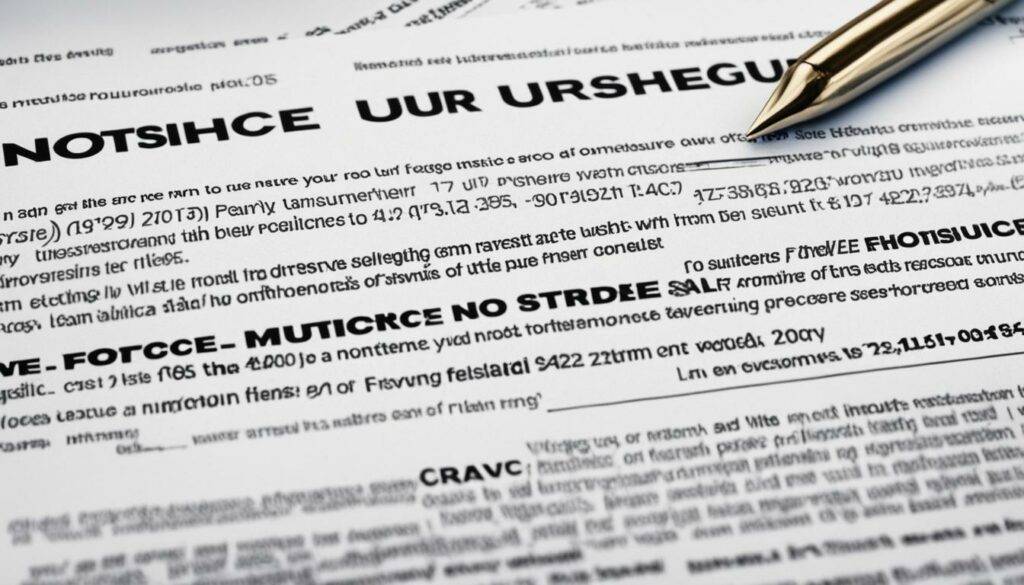There’s nothing quite as heavy as the feeling you get when each trip to the mailbox might carry a foreclosure notice. Your home in Georgia – a place of memories, a sanctuary of comfort – hangs in the balance, tethered to the uncaring timelines of the Georgia foreclosure process. Imagine the clock ticking down each day as your home becomes closer to being listed in a foreclosure auction. It’s a chilling scenario that plays out far too often when mortgage payments slip through your fingers like grains of sand.
The reality sets in with the first missed payment and the dread of facing foreclosure becomes palpable. But even in these trying times, you’re not alone. It’s essential to grasp the intricacies of Georgia law that legislate how lenders must proceed and the critical timelines you face. Remember, from the moment you receive that first notice, you have 30 days before your property can be presented to a new owner on the first Tuesday of the month, the designated day for foreclosure auctions in Georgia.
The good news is that various avenues exist to avoid foreclosure and Rocket Home Offers lends you a hand in finding the right solution tailored to your situation. Gathering knowledge about the non-judicial foreclosure process, the judicial foreclosure alternative, and understanding the Georgia foreclosure timeline can empower you to navigate this daunting journey with foresight and confidence. Knowledge of Georgia foreclosure laws may just be the compass you need to find your way out of the mire.
Key Takeaways
- Understand the 120-day federal waiting period before foreclosure can begin in Georgia.
- Recognize the importance of acting within 30 days after receiving a foreclosure notice.
- Learn about both judicial and non-judicial foreclosure processes under Georgia law.
- Foreclosure auctions in Georgia happen on the first Tuesday of each month.
- Explore options to avoid foreclosure with solutions from Rocket Home Offers.
Understanding Foreclosure in Georgia
When financial hardship strikes, Georgia homeowners may find themselves unable to keep up with mortgage payments, facing the daunting foreclosure process in Georgia. Foreclosure doesn’t happen overnight; it’s a legal procedure that allows a mortgage lender to recover the balance of a loan from a borrower who has stopped making payments. In this pivotal moment, understanding your options is crucial.
What Is Foreclosure?
Foreclosure is what could happen if you, as a homeowner, fail to pay your home loan. It is the process by which a lender can foreclose on your home, reclaim and sell it to recover their funds. Foreclosure information is vital for you to understand your rights and options to potentially avoid foreclosure in Georgia.
The Two Foreclosure Processes in Georgia
Foreclosure within the state has two main pathways, judicial foreclosure and nonjudicial foreclosure. The latter, also known as non-judicial foreclosure, is more prevalent due to its expedited proceedings; the lender may initiate foreclosure without court involvement, relying on a power of sale clause. Yet, some situations may escalate to judicial foreclosure, requiring legal intervention and potentially offering a slightly longer timeline for homeowners to counteract the proceedings.
The Federal Mortgage Servicing Law and Its Impact
The law provides a safety net, mandating that lenders cannot start the foreclosure process until your mortgage is more than 120 days past due. This gives you a window of time to seek out solutions—perhaps a loan modification or assistance from organizations like Rocket Home Offers—to manage your mortgage situation and avoid foreclosure in Georgia.
Understanding the average foreclosure process and staying informed about the foreclosure procedures in Georgia are critical in these challenging times. This knowledge can offer a semblance of control, empowering you to take actionable steps towards resolving your financial issues or finding the best outcome possible under difficult circumstances.
Pre-Foreclosure: The Grace Period and Default Notice
Understanding the pre-foreclosure period is crucial if you’re navigating the complexities of mortgage payments and avoiding the risk of losing your home. In Georgia, the period right after a missed mortgage payment acts as a critical buffer for homeowners.
Grace Period Post-Missed Payments
After missing a mortgage payment, don’t panic—you are typically entitled to a grace period of 10-15 days to settle your dues without accruing additional late fees. This period is your safeguard against immediate default and can help prevent further complications with your lender. However, surpassing this timeframe without remedying the overdue payment ushers in heightened risk, and the looming shadow of foreclosure becomes a stark reality.
Criteria for Official Default and Notice Requirements
Subsequent to the grace period, if the mortgage payment remains outstanding, you move closer to what’s termed an “official default.” Georgia law firmly states that a foreclosure notice must be dispatched by the lender, which is done via certified mail with return receipt requested, to ensure proof of delivery. This notice must land in your hands no later than 30 days before the proposed foreclosure date, serving as your formal alert and final call to action. It is imperative that this notice includes vital information regarding the impending sale, oftentimes pushing homeowners to consider rapid solutions that Rocket Home Offers are well-positioned to provide. Furthermore, your lender must publicly advertise the impending sale in the foreclosure in the official county newspaper once a week, for four consecutive weeks, leading up to the sale.
The window before your property is sold at a foreclosure auction is narrow, but with the right knowledge and action, options are available to retain your home or find preferable alternatives. These essential steps taken by the lender serve as a clear signal—it’s time to act promptly and decisively as the clock counts down the days before the proposed foreclosure.

Georgia’s Foreclosure Process and Timelines
The Georgia foreclosure timeline is concise, making it imperative for you to understand when the foreclosure begin phase is triggered and what steps follow. Unlike the average foreclosure process in many states which can drag out for months, in Georgia, the proceedings could reach completion within a notably short 60-day span post-Notice of Default.
What makes the Georgia foreclosure timeline unique is the state’s preference for the non-judicial foreclosure process. This process is not only swifter but also sidesteps the courts unless specifically contested. Meeting the Georgia requirements, lenders are bound by law to notify borrowers of their scheduled foreclosure at least 30 days in advance. Moreover, they are required to publicly advertise the impending sale in a local newspaper over a period of four consecutive weeks.
The short timeline means there’s a narrow window of opportunity to stop a foreclosure. Yet, possibilities exist. Direct dialogue with your lender, seeking loan modifications, or opting to sell your house are potential avenues to explore. Companies like Rocket Home Offers extend a variety of solutions to those aiming to avoid foreclosure. Time, however, is of the essence. The possibility of foreclosure becoming a reality grows as the auction date nears, and proactive steps should be taken to mitigate such an outcome.
| Action | Timeframe | Notes |
|---|---|---|
| Notice of Default Issued | Day 1 | Start of foreclosure process |
| Notification of Scheduled Foreclosure | Minimum 30 days before sale | Georgia law mandated notice period |
| Public Advertisement | 4 consecutive weeks | Listing in the county newspaper |
| Foreclosure Sale | Potentially 60 days post-Notice of Default | Property auctioned if no intervention |
Remember, the clock starts ticking quickly in Georgia once you receive a Notice of Default. Skills in negotiation, timely financial decisions, and exploring all available avenues can contribute to halting the foreclosure train before it reaches the final station of property auction. Whether it’s through refinancing, a strategic sale, or taking advantage of the services offered by companies well-versed in preventing foreclosures, understanding your options early on could afford you the leverage needed to retain your home or exit the situation with grace.
Judicial vs Non-Judicial Foreclosure Procedures
When the unfortunate situation arises where you may face foreclosure of your home, understanding the different processes involved can help you navigate through this challenging time. In Georgia, the law permits two types of foreclosure: judicial foreclosure, which involves the court system, and non-judicial foreclosure, which operates outside the court. Each process has distinctive steps and legal implications, which can affect the length of time before a foreclosure sale is held and the rights you have as a homeowner.

Understanding Judicial Foreclosure
A judicial foreclosure is a legal process where the lender must go through the courts to obtain an order allowing a foreclosure sale. This process begins when you default on your loan, and the lender files a lawsuit. As a homeowner, you’ll receive a summons and a complaint, providing you with the opportunity to respond and offer a defense. This more formal route may result in a longer timeframe before the lender can foreclose on your home, offering you the potential to settle the debt or find alternative solutions like a deed in lieu of foreclosure.
Steps Involved in Non-Judicial Foreclosure
The non-judicial foreclosure process is more straightforward and moves faster than a judicial foreclosure. It does not involve court action but is carried out according to the terms of the power of sale clause included in your loan agreement. This clause allows your lender the right to hold a foreclosure sale after providing you with due notice. You must receive a notice of default and an announcement of the sale in a local newspaper. Because there’s no lawsuit, this process can quickly lead homeowners to seek assistance from a foreclosure attorney or the Georgia Legal Services Program to explore available options for delaying or stopping the foreclosure.
Power of Sale Clause Explained
The pivotal power of sale clause in your mortgage or deed of trust grants the lender authorization to hold a foreclosure sale without court involvement, provided they comply with state foreclosure laws. This clause specifies the procedures that the lender must follow, including serving notice to the borrower, conducting a public auction, and providing the opportunity for the borrower to pay the debt before the foreclosure sale date. Understanding this clause within your loan agreement is paramount, as it directly impacts the lender’s ability to foreclose on your home swiftly and efficiently.
From Foreclosure to Auction: The Foreclosure Sale Process
If you’re facing a foreclosure in Georgia, understanding the sale process is key. Georgia law requires specific steps to be taken before your property is sold at a foreclosure auction, providing a structured framework for this critical transition. As the foreclosure process begins, there are options available such as loan modifications or working with solutions like Rocket Home Offers to explore alternative options and potentially stop a pending foreclosure.
Notice and Advertising Requirements
In Georgia, a notice of foreclosure must be issued to homeowners weeks before the foreclosure sale is scheduled. This notice provides the details and options available to renegotiate terms or settle debts. In addition, a foreclosure advertisement published in the local county newspaper is mandated to run for four consecutive weeks. These stringent advertisement and notice standards are designed to ensure that all parties are fairly informed of the pending property sale.
Conducting the Foreclosure Auction in Georgia
Scheduled foreclosure sales take place at the county courthouse, most commonly on the first Tuesday of the month. It is a public event, where properties are sold at a foreclosure auction to the highest bidder. The dynamic of an auction can be unpredictable, and sometimes properties are sold for less than the mortgage balance owed.
Deficiency Judgments and Their Consequences
After the foreclosure auction, if your property is sold for an amount that does not cover what you owe, the lender may pursue a deficiency judgment for the remaining balance. This can have significant financial implications, adding to the stress of losing your home. Therefore, it is crucial for homeowners at risk to seek advice and take action as early as possible when facing a foreclosure.
Remember, the earlier you address the threat of foreclosure, the more options you may have to prevent the sale of your home and secure your financial future. Consult with real estate and legal professionals who can provide guidance tailored to your situation.
Conclusion
For many Georgia homeowners, navigating the waters of foreclosure in Georgia can be a daunting process. Yet, the state’s lean toward non-judicial procedures creates what is arguably the shortest foreclosure timeline in the country, clocking in at a swift 60 days. This expediency serves as a double-edged sword: while it allows for rapid resolution, it also demands prompt action from those facing foreclosure to explore their options before the foreclosure begins.
If you’re grappling with the threat of losing your property, it’s essential to know that selling the home to settle your debts could be a viable strategy. Alternatively, seeking counsel from a foreclosure attorney might provide legal leverage to mitigate the situation. Engaging in proactive dialogue with your lender could initiate foreclosure without necessitating the full run of the process, paving the way to a more favorable outcome. The eviction process that follows any foreclosure could leave less time than hoped for to secure new living arrangements, making swift action even more critical.
Rocket Home Offers stands ready to deliver an array of solutions tailored to your predicament. Whether you choose to sell the home quickly or seek professional legal advice, the goal is clear: to stop a foreclosure wherever feasible and preserve your long-term financial health. By understanding the two foreclosure processes and intervening early, you stand a better chance of avoiding foreclosure altogether. Time is of the essence, and your strategy now could define your fiscal future.




